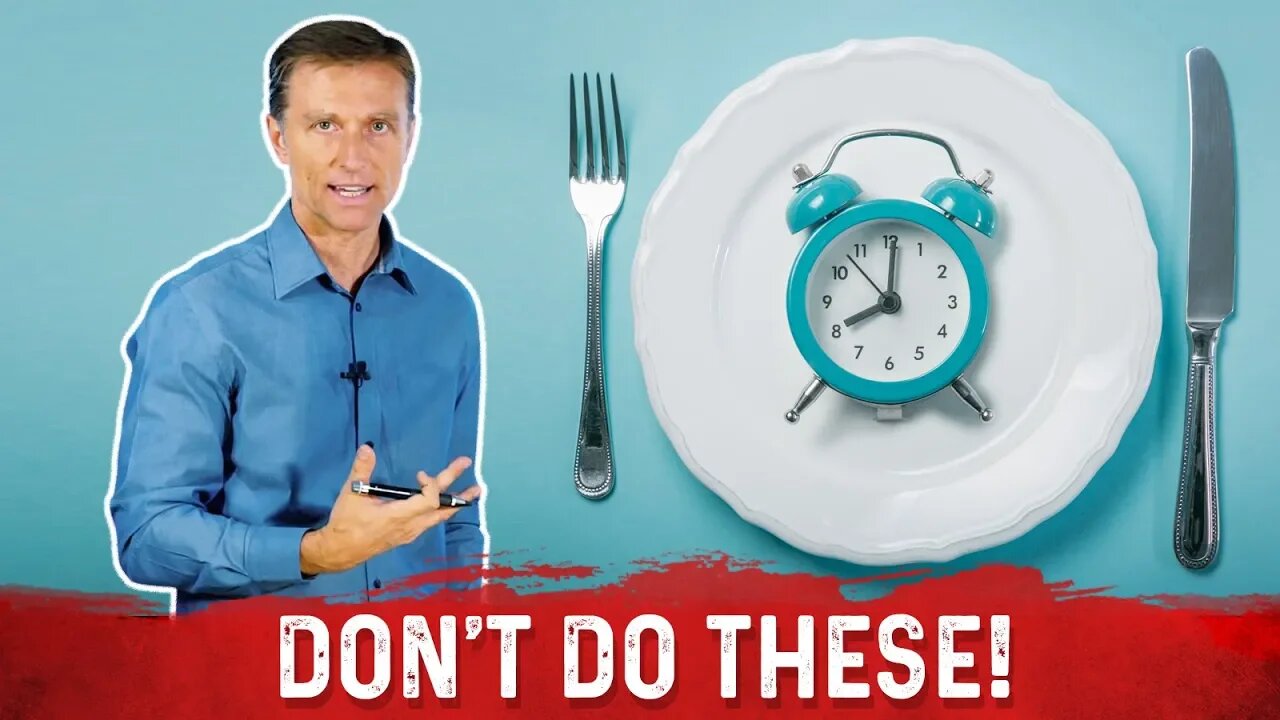Premium Only Content

5 Things NOT To Do When Starting Intermittent Fasting – Dr.Berg
Intermittent fasting is incredibly beneficial but not if you do these five things!
Timestamps:
0:00 When you’re doing intermittent fasting, don’t do these 5 things
0:58 5/2 fasting is a bit painful because you never really keto adapt
2:30 Don’t omit keto when you’re intermittent fasting!
Here are five things not to do when you’re doing intermittent fasting because they’ll impede or prevent your progress:
1. Consuming branch chain amino acids (BCAAs) or collagen when you’re in the fasting state. Both of these are proteins and will knock you out of ketosis.
2. Going on a schedule called 5/2. Five days of the week you do whatever you eat whatever you want and the other two days you go on a low-calorie diet, maybe 500 calories a day. This isn’t consistent enough to get the benefits of fasting; plus, those 500 calories aren’t really fasting and you never really keto adapt.
3. Omitting salt and electrolytes, which contain minerals but no calories. If you omit these you could experience some health issues. Many people have a subclinical nutrient deficiency or nutritional deficiency as they enter into fasting, which magnifies these deficiencies. The last thing we want is you feeling faint, dizzy, or even passing out. Your body and especially your heart needs electrolytes such as potassium and sodium. Salt will also prevent weakness and fatigue.
4. Eating a huge meal when you break a prolonged fast can create huge problems. Your enzymes aren’t built up and you shock your body with a huge meal after it’s become used to fasting. Instead, eat a small healthy meal, wait a little bit to see how your body responds, and if all is well then have another small healthy meal. If you’re doing one meal a day (OMAD) it’s okay to eat a big meal but not if you’re fasting for several days.
5. Omitting keto when you’re intermittent fasting. I know people who are intermittent fasting but when they eat, they eat whatever they want. What’s the point of getting the incredible benefits of lowering insulin from fasting then putting garbage back into the body? You want to combine healthy keto with intermittent fasting.
Be sure to avoid these five things when you’re intermittent fasting in that way you can get the most benefits.
Talk to a Product Advisor to find the best product for you!
Call 1-540-299-1556 with your questions about Dr. Berg's products. Product Advisors are available Monday through Friday 8am-6pm and Saturday 9am-5pm EST.
* At this time, we no longer offer Keto Consulting and our Product Advisors will only be advising on which product is best for you and advise on how to take them.
Dr. Eric Berg DC Bio:
Dr. Berg, age 56, is a chiropractor who specializes in Healthy Ketosis & Intermittent Fasting. He is the author of the best-selling book The Healthy Keto Plan, and is the Director of Dr. Berg Nutritionals. He no longer practices, but focuses on health education through social media.
Follow Me On Social Media:
Facebook: https://bit.ly/FB-DrBerg
Instagram: https://bit.ly/IG-DrBerg
Anchor: https://bit.ly/Anchor-DrBerg
TikTok: https://bit.ly/TikTok-DrBerg
DR. BERG'S SHOP: http://shop.drberg.com/
Send a Message to his team: https://m.me/DrEricBerg
ABOUT DR. BERG: https://www.drberg.com/dr-eric-berg/bio
Disclaimer:
Dr. Eric Berg received his Doctor of Chiropractic degree from Palmer College of Chiropractic in 1988. His use of “doctor” or “Dr.” in relation to himself solely refers to that degree. Dr. Berg is a licensed chiropractor in Virginia, California, and Louisiana, but he no longer practices chiropractic in any state and does not see patients so he can focus on educating people as a full time activity, yet he maintains an active license. This video is for general informational purposes only. It should not be used to self-diagnose and it is not a substitute for a medical exam, cure, treatment, diagnosis, and prescription or recommendation. It does not create a doctor-patient relationship between Dr. Berg and you. You should not make any change in your health regimen or diet before first consulting a physician and obtaining a medical exam, diagnosis, and recommendation. Always seek the advice of a physician or other qualified health provider with any questions you may have regarding a medical condition.
Thanks for watching!
-
 16:57
16:57
Dr. Eric Berg
10 days agoThe History of How Natural Medicine Was Erased (They Thought You’d Never Find Out)
8.1K25 -
 1:33:31
1:33:31
Barry Cunningham
11 hours agoBREAKING NEWS: KASH PATEL AND DOJ HOLD PRESS CONFERENCE UPDATE ON NATIONAL GUARD ATTACK
70.8K24 -
 LIVE
LIVE
Wendy Bell Radio
6 hours agoPoint Blank Hate
6,167 watching -
 1:22:22
1:22:22
iCkEdMeL
1 hour ago $4.76 earned🔴 BOMBSHELL: DC Shooter Worked With CIA-Backed Unit in Afghanistan, Officials Say
3.3K -
 17:28
17:28
Tactical Advisor
1 day agoComparing the NEW Cloud Defensive EPL
6901 -
 LIVE
LIVE
freecastle
10 hours agoTAKE UP YOUR CROSS- THANKSGIVING MUSIC EXTRAVAGANZA!
67 watching -
 57:54
57:54
A Cigar Hustlers Podcast Every Day
6 hours agoCigar Hustlers Podcast Evere Week Day w/Steve Saka
81 -
 1:09:06
1:09:06
Mike Mac - Say Something
16 hours agoSAY SOMETHING w/ MIKE MAC
41 -
 30:15
30:15
DeVory Darkins
10 hours agoTrump drops NIGHTMARE NEWS for Afghan refugees after National Guard Shooter is identified
140K158 -
 LIVE
LIVE
Lofi Girl
3 years agolofi hip hop radio 📚 - beats to relax/study to
343 watching